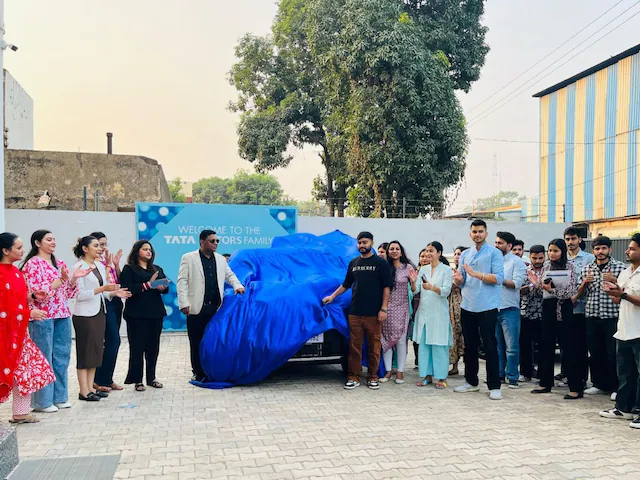In a heartwarming and unconventional Diwali gift, a pharmaceutical firm in Panchkula, Haryana, has surprised 15 of its employees by gifting them brand-new cars. The company’s owner, who refers to the staff not as employees but as “celebrities” and “rockstars,” said the firm treats its workforce as family. The gesture has raised eyebrows and sparked conversations about employee appreciation and reward systems in modern workplaces.
A Unique Corporate Culture: “We Call Them Our Celebrities”
The owner of the company emphasized that they operate “a little differently” than most corporate structures. “We don’t call them employees, we call them our celebrities, our rockstars. They are our family,” he said, adding that this Diwali gift was just one way of showing gratitude for the hard work and dedication of the team.
The firm aims to go even bigger next year, with the owner stating, “We want to gift 50 cars next year.” This announcement has left many wondering: Could this be the new norm for employee appreciation in India?
Employee Appreciation in India: A Growing Trend?
In recent years, there has been a growing trend among companies in India to step up their employee recognition programs, especially during festive seasons like Diwali. From extravagant bonuses to luxurious gifts, companies are finding innovative ways to keep their employees happy and motivated. But gifting cars takes this to a whole new level.
Traditionally, employees in India have been rewarded with bonuses, gadgets, or vacation packages during festivals. However, gifting cars is not only a symbol of financial success but also an extraordinary gesture of appreciation. This Haryana-based firm has certainly set the bar high for employee rewards.
Why Gifting Cars Could Be More Than Just a Gesture
While the car gifts are certainly a great surprise for the employees, there may be more to this gesture than meets the eye. Gifting cars ahead of Diwali might also be a strategic move for employee retention and morale boosting. In an era where job loyalty can be hard to maintain, such a grand gesture could help create a loyal, long-term workforce.
Additionally, this move speaks volumes about the company’s financial health. The ability to gift cars to multiple employees suggests a strong bottom line and could help attract top talent in the future. With plans to gift 50 cars next year, the company appears confident in its growth trajectory.
The Future of Employee Rewards: Are Cars the New Gold?
As companies look for more creative ways to reward employees, could cars become the new standard? In an increasingly competitive job market, unique rewards like this could help companies stand out. While not every firm has the resources to gift cars, this trend highlights the importance of making employees feel valued in significant and personal ways.
However, it’s essential to remember that not all rewards need to be as extravagant as a car. The key takeaway from this gesture is the sense of value and appreciation it imparts. Whether it’s a car, a bonus, or even a public recognition event, rewarding employees in a meaningful way can go a long way in boosting workplace morale.
Employee Reactions: A Boost in Morale and Loyalty
As expected, the employees who received the cars were thrilled. The gesture not only boosted morale but also fostered a stronger sense of loyalty towards the company. The gift served as a reminder that their hard work and dedication do not go unnoticed.
One of the employees said, “I was shocked when I received the keys to a brand-new car. This company truly treats us like family.” Another added, “It’s not just about the gift; it’s about how much they care about us.”
A New Era in Corporate Culture?
This bold move by the Haryana-based firm might indicate a shift in corporate culture, where the relationship between employers and employees is becoming more personal and family-like. In an era where the line between work and life is increasingly blurred, this approach to employee appreciation could signal a new trend in the Indian workplace.
The question now is: Will other companies follow suit? As competition in the job market intensifies, unique gestures like this might become more common as companies look for ways to differentiate themselves and retain top talent.

